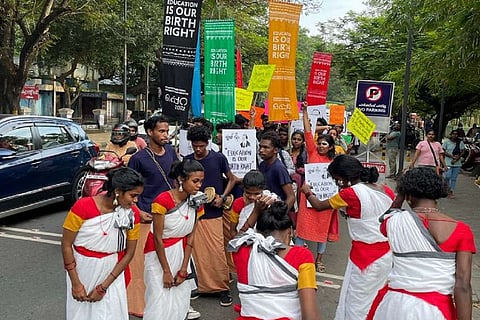

Holding placards proclaiming ‘Education is our birth right’. over a hundred students from tribal and scheduled caste communities took out a protest march from Gandhi Square near Rajendra Maidan in Kochi to High Court Junction on Saturday, December 10. The protest was organised by the Dalit-Adivasi student collective Adishakthi Summer School, demanding the provision of adequate hostel facilities for students belonging to Scheduled Caste and Scheduled Tribe communities, an increase in e-Grant allowances and ending the authoritarian management of SC-ST hostels by bureaucrats.
“Every district should have enough hostels for SC and ST students. They are not able to afford private places. In Aluva in Ernakulam district, construction work on two hostels have been completed but they have not been opened. In a city like this at least Rs 4,500 to Rs 7,000 is required to stay in hostels or as paying guests. SC students get only Rs 1,500 as a stay grant, which is not sufficient. The grant has to be increased,” said Mary Lydia K, State Coordinator, Adishakti Summer School.
She also pointed that some of the officers responsible for their welfare are showing clear discrimination against the Dalit students. “Many students drop out from good colleges after getting admission due to lack of hostel facilities and behaviour of such officers,” Lydia said. The students who took part in the march also presented their traditional artforms as part of the protest.
The summer school, an initiative of the Adivasi Gothra Maha Sabha, holds workshops and camps during summer holidays. The summer school is held with the main aim of promoting continued education and higher educational ambitions among the tribal students. The Adishakthi summer school was started in 2015 at Aralam in Kannur district. Since then, the summer school has been conducted every year at various locations in Kerala.
The main activities of the camp, apart from sessions on higher educational possibilities, include lectures on self reflection of the Adivasi identity, sessions on theatre and tribal songs to explore the Adivasi heritage and culture. The students are also given training in Spoken English. They are also provided opportunities to interact with various social activists too.